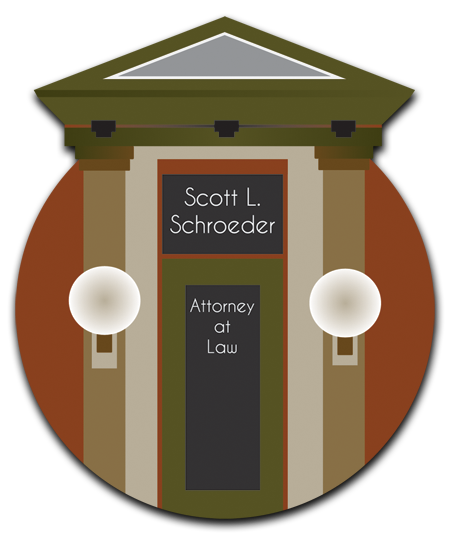Authors: Scott Schroeder, Colin Nicholson
I began practicing law in 1988, working for law firms that utilized cutting edge technology such as: typewriters, carbon paper, law libraries with pocket parts and land line telephones. I can tell you that I have not experienced the practice of law change so abruptly as it has in just a mere few months, with the change wrought by the COVID-19 pandemic. We are forced to change the fundamental way that we meet with our clients. We used to meet clients in the office building to encourage “hands on” meetings. My baby boomer clients expect in person, hands on meetings. They like handing me documents and meeting face to face.
We, as lawyers, had just dipped our toes into the deep end of the technology pool before the pandemic. In Wisconsin, we reluctantly went kicking and screaming into e-filing in the last couple of years. We suffered learning pains associated with implementing the e-filing system, but most agree it was a great improvement. The COVID-19 pandemic is the bully that kicked our ass into the deep end of the pool and screamed “sink or swim.” The advent of the pandemic has forced my practice to move from the older “hands on” approach to the “hands off” millennial approach.
In response to COVID, my will signing process has been revamped. We still have the client fill out the paperwork and either email it or drop it off in the new lockbox. We have replaced the roundtable meeting with a phone conference. This is not as effective as something is inevitably lost over the phone. We then send the rough draft to the client for their approval. Next, we perform a drive-up will signing. Law firm staff suit up in PPE. I go out to their car with a clipboard containing the will. When the client is ready to sign the will, the staff come out to witness the signing from a social distance. Next, we take the papers into the building to sign and confirm. Staff wipe down the clipboard and provide the original will to the client. The client keeps the pen for safety reasons.
My practice has adapted in many ways. We now use a locked front door with a video doorbell. A lockbox was set up for dropping off documents. We obtained PPE for employees and guests of the building to use. We maintain social distance in the office. All employees hunker down in their own corner of the building. Clients are directed to use phone conferences/Zoom meetings. Regardless of government directives, our firm will not knowingly be involved in the spread of this disease. We are reluctant to reopen the office building; I will err on the side of caution.
I am optimistic about the future changes COVID is forcing upon my practice and the legal profession. Utilization of online meetings not only increases efficiency of the client to lawyer communication; but perhaps more importantly, the lawyer to court communication. I no longer have to collect my client, drive to the courthouse and wait for my turn in front of the judge. I can now coordinate everything from my desk. I can call the client to prepare for the hearing. Courts are also in better control of their time. Judges can mute people and move things along efficiently. The hosts of people waiting outside the courtroom doors are no longer a constant stressor. This reduced waiting time at court results in less time billed to that client, while simultaneously allowing me to get other work done at my desk.
Looking further down the road, I envision a future law practice utilizing a digital presence that minimizes in person interactions. The lawyer can market as an “Avatar Lawyer” that makes digital online court appearances. The avatar lawyer meets with the client online to prepare digital court filings. The client can also interact as an avatar to eliminate any biases that the lawyer or court system may possess based upon the individual’s appearance. The advantages of using avatars for both the lawyer and client would further the goal of equal justice for all. As a practical matter, it would allow the avatar lawyer to go to the grocery store anonymously in person. The lawyer could have distinct professional and personal lives. The lawyer’s marketing efforts would be to develop a unique avatar in the legal digital world.
Just as e-filing was a difficult but much improved transition, I foresee the changes wrought by COVID on the legal practice to be a catalyst for the development of our profession into avatar lawyers. Like it or not, we are all swimming in the deep end.
Scott L. Schroeder is a graduate of Marquette University Law School and has been practicing law since 1988. He is on the board of directors of the Wisconsin Association for Justice, and sits on the Workers Compensation and Employment Law Committees. Scott has published opinions and oral argument before the Wisconsin Supreme Court and Court of Appeals. Scott has tried jury trials in many circuit courts of the State of Wisconsin.
Colin Nicholson is a 2L at Marquette University Law School. Colin has recently transitioned from his role as a Sergeant in the Marine Corps where he deployed twice to the Middle East. He then obtained his B.A. in Criminal Justice Studies from San Francisco State University.
Email: Scott@ScottSchroederLaw.com
©2020. Published in GPSOLO, Vol. 37, No. 4, July/August 2020, by the American Bar Association. Reproduced with permission. All rights reserved. This information or any portion thereof may not be copied or disseminated in any form or by any means or stored in an electronic database or retrieval system without the express written consent of the American Bar Association or the copyright holder.
